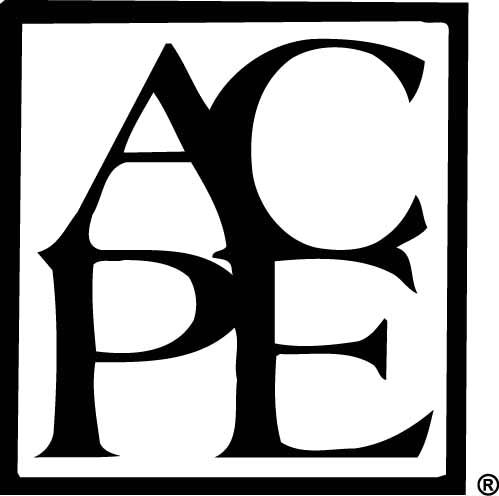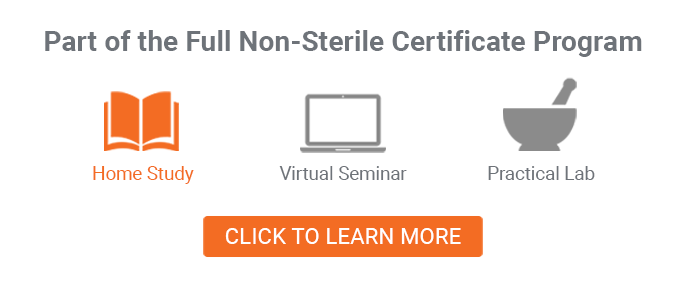The Science of Pharmaceutical Compounding: Non-Sterile Training | Home Study - Canada
COURSE FORMAT
Home Study (24 hours) that reviews fundamental concepts in non-sterile compounding. The program concludes with a learning assessment and associated feedback.
INSTRUCTIONAL DESIGN
The Home Study is a comprehensive knowledge-based program that introduces core concepts and a set of practice tools that guide the Pharmacist and Pharmacy Technician in their day-to-day practice. Each section of the program concludes with a learning assessment, which also provides feedback to the learner.
DESCRIPTION
Today, operating or working in a compounding facility in the role of pharmacist or technician is more sophisticated. To distinguish your practice and meet the demands of this growing market, the adoption of a best practices model to manage a compounding pharmacy is essential. The implementation of best practices implies being efficient and effective (i.e., doing the right thing right). The overarching topics addressed in this program can be categorized into three components; standards of practice, business development, and compounding processes.
Implementing Standards of Practice
One of the primary objectives of this activity is to highlight the necessity of operating within a regulated and well-documented framework that adheres to established standards of practice. To do so, participants will learn how to practically implement and apply standard operating procedures, competency trainings, and ongoing compliance assessments with the fundamental philosophy of continuous quality improvement.
Business Development and Growth
A well-developed business acumen is also essential in operating a successful compounding practice. This activity will provide participants with applicable marketing and business strategies to kick-start or enhance their compounding practice.
Optimizing Compounding Processes
Compounding process development brings together everything from the physicochemical properties, uses, and applications of raw ingredients to finished compounded preparations. The fundamental first steps of every compounding process is knowing what ingredient to select; how to interpret and implement information found in a monograph and certificate of analysis; pharmaceutical calculations, including potency adjustments, salt-base conversions, water-content adjustments, among more. From here, participants will review key preparatory techniques and the integration of technology when formulating different non-sterile dosage forms (e.g., oral liquids, capsules, topicals, molded dosage forms, etc.). Lastly, emphasis will be placed on verification procedures to ensure the quality, safety, and integrity of the compounded preparation.
With these three foundational components, this activity provides participants with the fundamental tools and knowledge needed to meet current compounding practice requirements. By taking this activity, the participant will realize the value, and gain the necessary knowledge and skills, to adopt and implement a best practices model for years to come.
Intended audience
- Pharmacists, Pharmacy Technicians, Pharmacy Managers, Designated persons in positions of responsibility, and Quality Assurance & Quality Control officers looking to advance their practical non-sterile compounding skills related to any professional setting.
- Auditors / Inspectors looking to hone their assessment skills in concert with the standards described and detailed in this Activity.
Learning Objectives
FOR PHARMACISTS:
- Relate unique and essential central core concepts.
- Describe regulatory framework requirements.
- Discuss standards of practice for non-hazardous and hazardous drug compounding.
- Defend components of a standard operating procedure.
- Apply business, marketing, and sales for a successful practice.
- Explain characteristics for routes of delivery in non-sterile compounding.
- Describe the chemical composition of different dosage forms.
- Apply pharmaceutical calculations to compounding.
- Match excipients to dosage forms, chemical composition, and routes of delivery.
- Match base types to dosage forms, chemical composition, and routes of delivery.
- Employ drug monographs and certificates of analysis to compounding.
- Describe techniques and technology used during compounding.
- Apply the components of process development.
- Rewrite a master formulation record.
- Discuss the requirements of a compounding record.
FOR PHARMACY TECHNICIANS:
- Relate unique and essential central core concepts.
- Review regulatory framework requirements.
- Explain standards of practice for non-hazardous and hazardous drug compounding.
- Describe components of a standard operating procedure.
- Discuss business, marketing, and sales for a successful practice.
- Explain characteristics for routes of delivery in non-sterile compounding.
- Describe the chemical composition of different dosage forms.
- Solve pharmaceutical calculations in compounding.
- Match excipients to dosage forms, chemical composition, and routes of delivery.
- Match base types to dosage forms, chemical composition, and routes of delivery.
- Relate drug monographs and certificates of analysis to compounding.
- Describe techniques and technology used during compounding.
- Outline the components of process development.
- Demonstrate the use of a master formulation record.
- Discuss the requirements of a compounding record.
Editors
| NEIL COHEN, BSc CE Program Developer Disclosure: None |  |
CONTRIBUTORS
JOE CABALEIRO, BS Pharm, RPh Contributor / Facilitator, LP3 Network |  |
JENNIFER CLARE, BSc Contributor / Facilitator, LP3 Network
|
MARK FILOSI, BS Pharm, RPh Contributor / Facilitator, LP3 Network
|
FINANCIAL SUPPORT
This learning activity has received financial support from MEDISCA Inc. in the form of an educational grant.
COPYRIGHT
The home study is copyright © 2002-2026 LP3 Network.
This learning activity has received financial support from MEDISCA Inc. in the form of an educational grant.
PHARMACISTS & PHARMACY TECHNICIANS
The Home Study is accredited for Pharmacists and Pharmacy Technicians by the Accreditation Council for Pharmacy Education (ACPE) through CPE Consultants, LLC.
Total CPE Credits: 24 CPE Hours = 2.4 CEUs
| Type | Application-based |
| UAN | 0864-9999-21-016-H07-P/T |
| Credits | 24 CPE Hours = 2.4 CEUs |
| Release Date | July 1, 2021 |
| Expiration Date | July 1, 2024 |
Completion Requirements
- Complete the Knowledge-based Home Study.
- Complete the learning assessment with a minimum passing score of 80%.
- Submit a completed Home Study evaluation online.
When the aforementioned steps have been completed and approved:
- Pharmacists and Pharmacy Technicians registered in the United States will obtain a statement of completed credits on their NABP e-Profile within 60 days.
- Pharmacists and Pharmacy Technicians registered elsewhere will receive an automated email from LP3 Network advising that they can download a statement of participation.
- All participants will receive an automated email from LP3 Network advising that they can download the LP3 Network certificate of completion.
 | CPE Consultants, LLC is accredited by the Accreditation Council for Pharmacy Education as a provider of continuing pharmacy education. |
International participants should verify with their respective governing board for accreditation equivalency.
Please note: This version of the home study is only accessible to those enrolled in a live event.

 Facebook
Facebook X
X LinkedIn
LinkedIn Forward
Forward